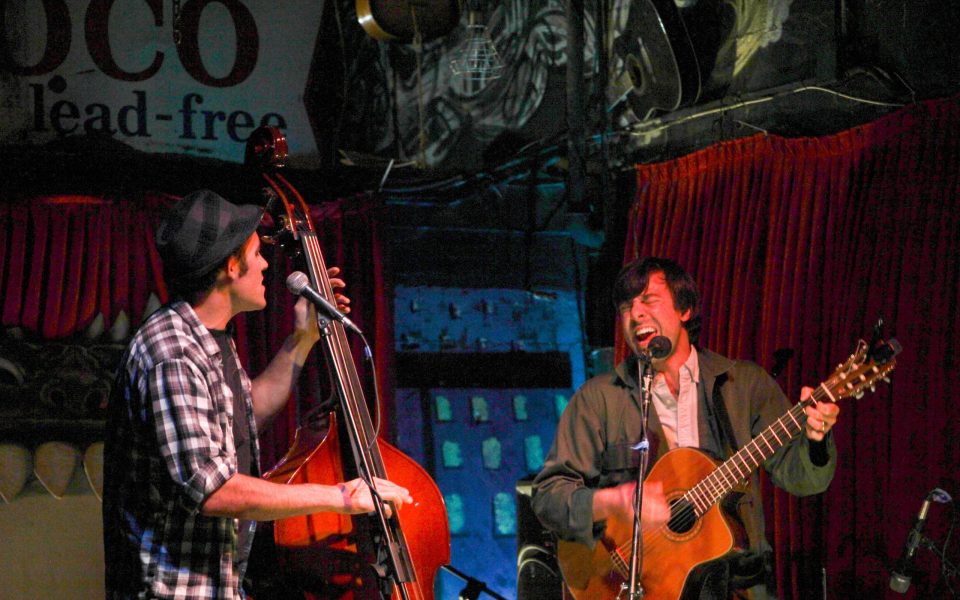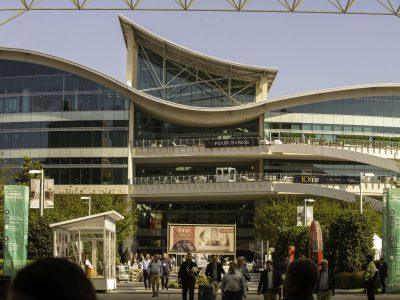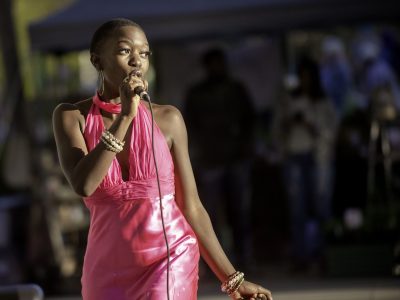Despite their coffee-house-acoustic looks, Benyaro sounded like a band of four during their show at the Garage on Nov. 12. (Daniel Wirtheim)
by Daniel Wirtheim
It begins with a sort of minor-chord samba on a nylon-string guitar, a bassline percolating beneath the rhythm, a few hits from a kick drum peppered in along with a couple of vocal “ohms.” By the time the maraca arrives, “Bullet-Like Belief” is in full momentum, a gradually rising wall of sound.
Riding that wall is Ben Musser, the creative force behind Benyaro who along with upright bassist Leif Routman played at the Garage on Nov. 12 as part of an East Coast-focused tour that ends this Friday in New York City.
Musser plays with a maraca strapped to his foot, the same foot that straddles the pedal of a hi-hat cymbal. His other foot is poised against a kick drum while a harmonica dangles from a holder around his neck. There’s no loops or prerecorded soundbytes; Musser and Routman build their immersive music from scratch.
“Bullet-Like Belief” is Benyaro at its best — soulful, textured and driving. If one were to close her eyes during a Benyaro performance, she might image a four-piece band. But Benyaro are masters of sounding more than the sum of their parts.
Standing up a band with just two musicians is an economical move. With only the two of them, Benyaro can live cheaply, touring out of a small car.
“Minimalism,” Musser said after the show. “I don’t know if it’s in, or hip, but it’s smart.”
Musser’s other instrument is his voice, which has an immediate likeness to Cat Stevens’ by way of phrasing and a broad vocal range that he can hit without straining his voice. It’s all there and coupled with the acoustic guitar chords it’s undeniably Cat Stevens-like, a comparison Musser’s heard many times before.
“Where will our perfect bodies go/ when you’re down with me in the ground,” he sings with a somber, soulful voice in “Bullet-Like Belief.”
The Benyaro repertoire includes the folky, sweeping numbers one might expect from an acoustic two-piece with a guitarist playing kick drum. But Benyaro can deliver some soul melodies and even one hip-hop-esque song “Home Cooking,” which is a nice lighthearted retreat but a bit jarring in an otherwise acoustic indie-soul set. “Eureka” — a song about a California city that Musser dislikes — is a bass-driven jam that most two-piece acoustic bands would be advised to avoid, but it fits well within the abilities of Benyaro’s multi-instrumentalist and accompanying bassist.
The band’s Winston-Salem set also incorporates a cover of Malcolm Holcombe’s “Crossing My Heart to the Homeland,” a gritty blues number that Musser plays with thick, fuzzy distortion while a hi-hat cymbal sits in for a snare to create a mean sonic animal. The stomping, electrified song is a nice change of pace from the acoustic numbers that after about 30 minutes seem to bleed into one long moment of predictable choruses and major lifts.
Musser started Benyaro started about eight years ago in New York City. Since then he’s switched up the lineup — most often performing as a duo — and moved to Jackson Hole, Wy., where he lives today. Being away from the city gives Musser the time he needs to write. And he’s been doing so a lot, anticipating a new release next spring with producer Danny Kadar, who worked with North Carolina favorites the Avett Brothers on a popular album, Emotionalism.
Benyaro is a busy band on and off the stage. Before playing in Winston-Salem, they recorded at a studio in Asheville. They commented on how tired they were to a thin crowd at the Garage. They’d played the venue before and had good relations with people in the city and especially Wake Radio, Wake Forest University’s student-run internet radio station, which has given Benyaro tracks regular airplay.
Musser just shrugged off the lack of audience. He played as if it were to a crowd of dedicated fans. It’s easy to not sweat the small stuff when you play four instruments at once.
Access tracks, photos, tour info and more at benyaro.com.
Join the First Amendment Society, a membership that goes directly to funding TCB‘s newsroom.
We believe that reporting can save the world.
The TCB First Amendment Society recognizes the vital role of a free, unfettered press with a bundling of local experiences designed to build community, and unique engagements with our newsroom that will help you understand, and shape, local journalism’s critical role in uplifting the people in our cities.
All revenue goes directly into the newsroom as reporters’ salaries and freelance commissions.





Leave a Reply